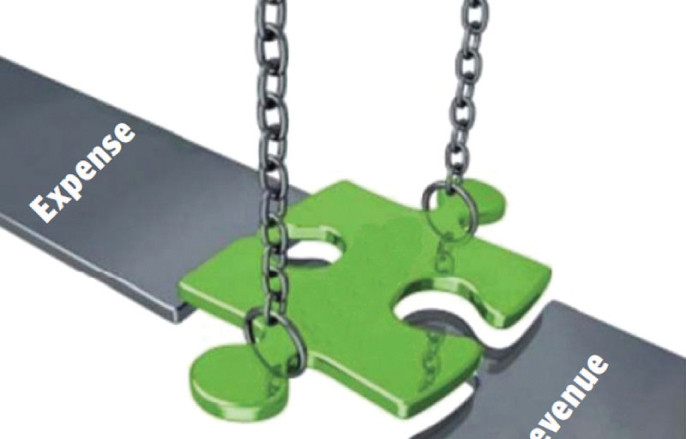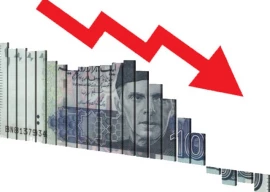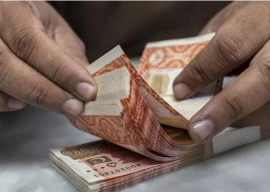
A one-off sudden spike in non-tax revenues has helped the government restrict the budget deficit to just Rs900 billion during the first four months of this fiscal year, despite a surge in interest payments to a staggering Rs2.3 trillion.
The higher non-tax revenues, which multiplied to Rs1.6 trillion, have also camouflaged the poor fiscal performance by the provinces that are seemingly on a spending spree ahead of general elections.
Government sources said that the central bank has given close to Rs1 trillion in profits in October, pulling the Centre’s non-tax income to Rs1.6 trillion during the first four months. Non-tax revenues were equal to 54% of the annual target after the federal government decided to tap the SBP profits beforehand. By the end of September, the government’s non-tax income was hardly Rs453 billion, according to Ministry of Finance documents.
During the July-October period of this fiscal year, the interest payment rose to Rs2.3 trillion or equal to nearly one-third of the annual allocations, according to government sources. They added that the higher debt servicing cost has, for now, been compensated by a bullet profit payment of close to Rs1 trillion by the State Bank of Pakistan.
The central bank injection, given before time, has helped restrict the federal budget deficit to Rs900 billion or 0.9% of the size of the economy. But its sustainability remains questionable. Interest payments were equal to 82% of the federal government’s net income of Rs2.8 trillion. Although the Ministry of Finance has allocated Rs7.3 trillion for interest payments in the budget, the International Monetary Fund (IMF) has already upwardly adjusted its debt servicing projection to Rs8.63 trillion.
The SBP-dominated Monetary Policy Committee (MPC) is scheduled to meet on Tuesday to set the policy rate for the next two months. The current interest rate of 22% is eating up most of the tax revenues and is a root cause of the record budget deficit.
The IMF has dispatched yet another technical mission to Pakistan to oversee the government’s budget processes. The mission held a preliminary meeting with the interim finance minister on Wednesday.
The SBP’s bullet payment was equal to about 90% of its annual profit target set by the finance ministry. The federal government also collected Rs340 billion on account of petroleum levy in four months. The government has already agreed to upwardly revise the annual petroleum levy collection target to Rs918 billion during the recent review talks with the IMF.
The FBR’s tax collection amounted to Rs2.75 trillion in four months – which was equal to 30% of its annual target. Gross federal revenue receipts amounted to Rs4.3 trillion on the back of SBP bullet payments. However, the federal government’s total net income, after transferring provincial shares, stood at Rs2.8 trillion.
In the first four months, the federal government’s total expenditures surged over Rs3.7 trillion, mainly because of interest payments that were equal to 62% of the total expenditures. Current expenditures amounted to over Rs3.6 trillion in four months. Defense spending was in line with the annual budget, standing at Rs472 billion.
Development spending also witnessed a significant cut, slowing down to just Rs76 billion – or 8% of the annual target. The provincial governments’ fiscal performance remained dismally poor. Cumulatively, they saved just Rs40 billion in four months against the annual commitment of Rs600 billion.
Read: Economy actually 'contracted' in last fiscal
The IMF has projected Pakistan’s budget deficit at 7.6% of the size of its economy, or a record Rs8.2 trillion, which was far higher than the official target and would keep the government dependent on lenders to remain afloat. The 7.6% deficit means that Pakistan will need to borrow Rs1.3 trillion more than what it had planned in June this year.
The IMF has praised the government’s fiscal performance during last month’s review talks, although it did not accept the official fiscal deficit figures shared by the finance ministry. But still, the finance ministry is struggling to get a board date from the IMF.
Neither the Ministry of Finance nor the IMF country representative replied to questions regarding the delay in the board meeting. The Ministry of Finance spokesperson also did not respond to a question about whether the first-quarter budget figures have been revised in light of IMF objections that the global lender raised last month.
Pakistan was hoping to get an IMF board meeting date in December for the completion of the first review amid the decline in its official foreign exchange reserves that again dipped to $7 billion as of last week. The board approval of the first review would unlock $700 million loan tranche. The IMF has released its board calendar till December 15th, and the country is not yet on the agenda.
The Associated Press of Pakistan (APP) reported on Thursday that Pakistan’s ambassador to the US Masood Khan hosted the officials of IMF and other financial institutions. The APP stated that Athanasios Arvanitis, Deputy Director of IMF’s Middle East and Central Asia Department, expressed the hope that the elections in Pakistan would usher in a new beginning of reforms that the country needed to address its structural issues.
The Election Commission of Pakistan is expected to announce the schedule for the February 8th elections, which may clear the air.
Head of IMF Mission to Pakistan, Nathan Porter, also reportedly expressed satisfaction over the recent staff-level agreement with Pakistan on a $3 billion standby arrangement, saying the present government’s policies reflected its commitment to stabilise the economy of the country. Porter also expressed appreciation for the cooperation and the policies pursued by the SBP for ensuring fiscal stability in the country, according to the APP.
Published in The Express Tribune, December 8th, 2023.
Like Business on Facebook, follow @TribuneBiz on Twitter to stay informed and join in the conversation.

1732184775-0/BeFunky-collage-(80)1732184775-0-165x106.webp)

1731933289-0/BeFunky-collage-(68)1731933289-0-165x106.webp)
















COMMENTS
Comments are moderated and generally will be posted if they are on-topic and not abusive.
For more information, please see our Comments FAQ